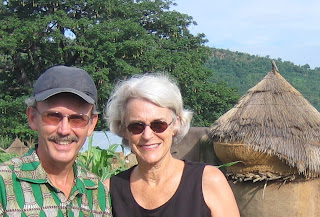Imagine no running water in your home, and the necessity of finding water EACH and EVERY day for the basic needs of life: preparing food, washing utensils, bathing yourself and your children, laundry and cleaning the home. Not to mention finding safe, potable drinking water to help prevent maladies such as cholera, typhoid, hepatitis and diarrhea from amoebas and giardia. This is reality for most throughout Africa. (On the other hand contaminated surface water enables a host of other diseases like guinea worm, yellow fever, malaria, river blindness, etc.)

It is typically the women and children who have the responsibility of “harvesting” enough water to meet their family’s needs. If they are lucky, they have access to a nearby community water pump. Unfortunately, pumps in general have a chronic break-down rate with repairs hard to come by due to unavailability of parts and/or knowledge of repair. Many villages have a well which can be a social gathering place too, but in dry season (5-8 months per year), they are often dry or murky and can become easily contaminated. Hillside springs are another source of water. The water trickles, but those who are patient can hopefully collect good clean drinking water as the spring slowly bubbles up. (Photo attached was taken this morning at a nearby spring. All of the attached photos were taken a short distance from our home.) And lastly there is surface water from stream and lakes, the least likely to be safe and clean.

In the dry season, when the wells and springs dry up, women need to find other sources. Typically they have to walk farther (in the heat), oftentimes for several kilometers, with the heavy load on their head. EVERY day. In rainy season, it becomes a little easier. Everyone puts their basins outside their home when the rain begins, and those with cisterns have gutters that feed them. Trapping water works especially well if you or your neighbor happen to have a rain spout.

Only a small fraction of Togo’s population has piped running water in their home. (We are one of those lucky few, although we still boil and filter it due to a questionable delivery system). Piped water is available (but not always affordable) in the larger towns and regional capitals, but almost non-existent in the rural areas. Our town of 35,000, Atakpamé, has many privately owned street faucets connected to the city water system spread throughout the town. Providers charge 25 CFA for a big basin, about 5 cents, which is comparable to the cost of a bowl of cooked rice purchased on the street. The charge provides a small profit after they pay the city for their metered water. In town, women probably don’t need to walk more than a ½ kilometer. But to gain a little appreciation for the task, you try walking on rocky roads and steep slippery slopes with an open 50 lb. basin of water on your head. Everyday.

Atakpamé also has a wonderful fountain from a natural spring source in the center of town with a park, whose modernization was funded by Rotary International in Northfield, MN. It is heavily used at all hours of the day and provides free, clean water. Way to go, Rotary - providing good water to hundreds of families in Atakpamé .

I remember, before coming to Africa, reading about the women who have to walk miles to get their water. This is a reality—not some “hard pitch” to get you to donate money to an organization. Water availability is a huge issue throughout Africa. Not just water availability, but access to SAFE water which can help prevent the diseases which are so rampant here. And as Jeffrey Sachs states in The End of Poverty, the water issue will grow in importance with climate change, as population densities and climate change interact to produce more water stress. Sub-Saharan Africa will be one of the hardest hit regions in the world.

One of the things we will bring back with us to the states is a greater appreciation for plain ol’ tap water!





















 Kids bring water to school . Cate wants to learn how.
Kids bring water to school . Cate wants to learn how.












